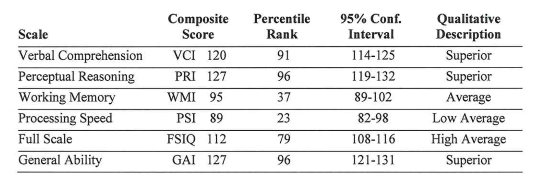If your child was given the WISC-V (Wechsler Intelligence Scale for Children® Fifth Edition) or the WPPSI-IV (WPPSI™-IV Wechsler Preschool & Primary Scale of Intelligence) tests, you might see a score listed as GAI, or the Gross Ability Index score. If the working memory and/or the processing speed is lower compared to the rest of the score profile, the tester should be providing the GAI score. The GAI score puts less emphasis on working memory and processing speed relative to the FSIQ (Full scale IQ).
For a more in depth look at what the GAI score is, refer to this information provided by the test publisher, Pearson.

In the above image, you can see the working memory and processing speed scores are lower than the others. With these scores included, the FSIQ is listed at 112. However, once you remove these scores from the profile, the GAI score increases to 127.
Why didn’t my child’s psychologist provide the GAI?
Not all profiles will require the GAI to be calculated. If the working memory and processing speed scores are inline with the other scores, the FSIQ would be considered valid. If your child’s processing speed and working memory scores are lower, then the GAI could be considered a more accurate representation. In talking with other parents, I have found some testers didn’t know to calculate the GAI under these conditions. If that was the case, you may be able to request the GAI scores to be calculated by the psychologist.
What does lower working memory and processing speed scores mean for my child?
Children that have lower processing speed and working memory scores may have a learning disability or ADHD. Parents and professionals may consider having more in-depth evaluations performed to determine if this is the case. Other considerations may include that the gifted student may be a perfectionist or high achieving. A more slow approach in problem solving insures they arrive at the correct solution, decreasing the probability of incorrect answers.
How can I increase my child’s working memory or processing speed abilities?
First thing you may want to do is rule out any learning disabilities or ADHD. (Otherwise referred to as 2E/Twice Exceptional) After diagnosis, therapies, and/or medications, you may see improvement in your child should they be evaluated again in the future. Sometimes the child will show higher scores when they mature. For example, a 4-year-old taking the WPPSI may be more squirrely or inattentive due to their age and maturity. They may retest at 7 using the WISC-V and have the ability to sit still and be more attentive than before.
To improve working memory and processing speed, you may introduce more brain games, puzzles, times activities into your child’s day. If your child has 2E issues, you will want to meet with the school about making accommodations for the student.
I hope this brief explanation of GAI scores is useful to you. Feel free to check out my blog for other posts you may find beneficial!

